October 9, 2002: Notebook
September
11, one year later
University marks anniversary of terrorist attacks

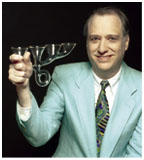 Gott
time?
Gott
time?
Photo: Richard Gott *73 holds one of his many teaching aids. (Denise Applewhite)
Astrophysics Professor J. Richard Gott *73 employs pizza, string, and miniature footballs to make it easier for his students to understand the heady concepts involved with time travel.
“It’s a fun topic, and it gives you a window on Einstein’s work,” says Gott, who wrote Time Travel in Einstein’s Universe (2001). “We’re trying to explore the laws of physics in extreme situations, which may provide some clues as to how the universe works.”
Gott says Einstein told us how one could visit Earth 1,000 years from now. All one would have to do is get in a spaceship, travel to a star a little less than 500 light years away at about 99.995 percent the speed of light, and return at the same speed. Upon arrival, Earth would be 1,000 years older, while the traveler would have only aged 10 years.
According to Gott, humans have already traveled through time. Russian cosmonaut Sergei Avdeyev, who was in orbit for 748 days during three space flights on Mir traveling at 17,000 mph. He eventually aged 1/50th of a second less than he would have if he had stayed at home. Thus, when he returned to Earth he found it to be 1/50th of a second to the future of where he expected it to be.
It does not seem like much, but Gott points out that the Wright brothers only traveled 120 feet in their initial flight.
When he arrived at Princeton in 1976, Gott developed one of the nation’s first courses in general relativity for undergraduates. One of his other classes, The Universe, geared toward nonscience majors, draws about 240 students a semester. By A.D.
For more on Richard Gott’s
research go to faculty
file at www.princeton.edu/paw. ![]()

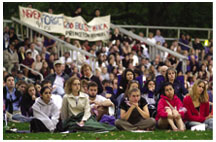 September
11, one year later
September
11, one year later University marks anniversary of terrorist attacks
Students, faculty, staff, and townspeople gathered on Cannon Green for a commemorative service. (Frank Mojciechowski)
Amidst the frenetic activity that comes with a new academic year, the first anniversary of the attacks of September 11, 2001, brought out the collective heart and mind of the Prince-ton University community as prayer, analysis, and reflection filled the day.
Many faculty, staff, administrators, students, and service workers marked the tragic day at prayer services, scholarly discussions, and an evening commemoration service, which drew more than 1,500 people to Cannon Green, including many local residents.
Even the normally steady buzz of construction ceased in the morning as workers sat around radios to listen to broadcasts of memorial services in New York City, Washington, D.C., and Pennsylvania.
In his sermon at a 9 a.m. service in the Chapel, the Rev. Dr. Thomas Breidenthal, dean of religious life, told those gathered to live without fear and to move away from the paralysis, fury, terror, and hatred that filled many in the last year, and to “move deeper into the presence of the living God.
“The love at the center of all things is real and calls us to join in that love,” he said.
After Opening Exercises, which began at two, came an intellectual exploration of the effects of September 11 at the Woodrow Wilson School, where the school’s new dean, Anne-Marie Slaughter ’80, led a panel discussion entitled “Legacies of September 11: Priorities and Challenges.” The dialogue focused on the impact the attacks have had on U.S. foreign policy, civil liberties within the country, and Europe’s relationship with the U.S. It drew hundreds of people to a packed Dodds Auditorium and simulcasts in three other rooms in Robertson Hall.
Slaughter dedicated the event to the memory of Joshua Rosenthal *81, whom she knew from their time at the WWS and who died in the attacks at the World Trade Center.
Joining her on the dais were Jeffrey Herbst ’83, professor of politics and international affairs; Frederick Hitz ’61, lecturer in public and international affairs and director of the Project on International Intelligence; Kathleen McNamara, assistant professor of politics and international affairs; Alan Krueger, the Bendheim Professor in Economics and Public Policy; and Aaron Friedberg, professor of politics and international affairs and director of the Center of International Studies.
Friedberg said last year’s attack may have raised the standard for future terrorists. “Those who want to make an impact will feel they have to kill thousands,” he explained.
While poverty and lack of education have been blamed for fostering an atmosphere for terrorism in the Middle East, Krueger suggested that the connections are not clear and cited his own recent research to show that terrorists in at least one group, Lebanon’s Hezbollah, were better educated and had better jobs than their peers.
Hitz reviewed the impact on U.S. civil liberties in the wake of the attacks and explained that many judges across the country are questioning the holding of citizens without charges or representation under the Patriot Act, which was passed in the wake of the attacks. “It is going to strain very much the fabric of constitutional protection,” he said.
Herbst predicted that we are in the “very early stages, the immature days, of a new U.S. foreign policy.”
McNamara played down the rift that is being reported between the U.S. and its European allies as America prepares for a possible attack on Iraq.
At 7 p.m., the focus turned to reflection as President Tilghman opened the commemorative service on Cannon Green by outlining Princeton’s response to the attacks, including the Arts Alive program, which provided tickets for New York City performances to more than 10,000 schoolchildren directly affected by September 11. “At the core of each of these programs is personal engagement, and a desire both to assist those directly affected by the attacks, and to contribute to renewal and recovery,” she said.
As darkness fell, prayers, poetry, music, and song preceded reflections from several faculty members and students, including Guy Nordenson, an associate professor of architecture who worked in recovery efforts at the World Trade Center in the days and months following the attacks, and Alexander Nehamas, a professor of philosophy and comparative literature.
“September 11, 2001, did not cleave time or history in two. It is – appallingly – one of innumerable horrors, past and future, each of which demands to be addressed in its own specific terms. But if we manage to see, and react to, that particular event as a part of history, then September 11 may have a lasting effect: It can stand for all unexpected catastrophes, as a reminder that our certainties are transient, our powers limited, our ability to control our fate – restricted,” Nehamas said.
Sobs could be heard in the
audience as the service closed with a lone bagpiper, Whitney Kalmbach
’05, playing “Amazing Grace” from the steps of Clio Hall.
![]()
By A.D.

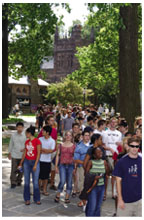 Welcome,
2006
Welcome,
2006
Photos: Incoming freshmen make their way to the Chapel for Opening Exercises. (Denise Applewhite)
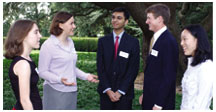 As
customary, student prizes were awarded at Opening Exercises. From left:
The George B. Wood Legacy Sophomore Prize went to Ruth Ilana Tennen ’04.
The George B. Wood Legacy
Junior Prize went to Adriene Erickcek ’03. The Freshman First Honor
Prize was awarded to both Varun Kishor Phadke ’05 and James Richard
Stillwagon ’05. The Class of 1939 Princeton Scholar Award went to
Peggy Hsu ’03. (Denise Applewhite)
As
customary, student prizes were awarded at Opening Exercises. From left:
The George B. Wood Legacy Sophomore Prize went to Ruth Ilana Tennen ’04.
The George B. Wood Legacy
Junior Prize went to Adriene Erickcek ’03. The Freshman First Honor
Prize was awarded to both Varun Kishor Phadke ’05 and James Richard
Stillwagon ’05. The Class of 1939 Princeton Scholar Award went to
Peggy Hsu ’03. (Denise Applewhite)
With the clamor of drums and the whoosh of colorful kites, the Class of 2006 was welcomed to Princeton in Opening Exercises that took place on the unfortunate date of September 11.
The day, one committed to mourning and remembrance across the country, began at nine o’clock at Princeton in the Chapel at a solemn worship service for the entire university community. Five hours later, the tone and tenor of the sacred space was palpably vibrant and alive with sounds that resonated off the freshly restored walls and windows of the gothic edifice and with exhortations that infused the attendees with hope and a sense of purpose.
The freshmen, 608 men and 558 women, come from 48 states (Arkansas and New Mexico are not represented), the District of Columbia, Puerto Rico, and 40 other countries. Half of the Class of 2006 are receiving need-based financial aid. Last year 46 percent of the freshmen received such aid, and in 2000, 40 percent did so. Princeton’s new financial aid policy, which gives more direct aid to more students, is now in its third year.
President Tilghman, delivering her second Opening Exercises address, reminded the students of the privilege of being at Princeton and underlined the value of a diverse student body. “A good part of your education in the next four years will come from conversations with your classmates and other students. Each of you will bring to these conversations a unique perspective on the world. Each of you is a resource for all the others.”
In addition, Tilghman reminded
students to respect the entire Princeton community, from the Nobel laureates
who teach to the groundskeepers who rake leaves.![]()
L.O.

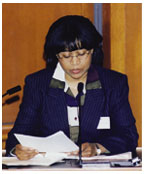 Photo:
Princeton Communications
Photo:
Princeton Communications
Claudia Tate, a professor of English and African-American studies, died July 30 of lung cancer. She was 55.
She earned her Ph.D. at Harvard and taught at Howard University and later at George Washington University. She had been a professor at Princeton since 1997.
Tate’s first book, Black Women Writers at Work, was published in 1983, and according to Valerie Smith, professor of English and African-American studies at Princeton, Tate’s “probing, provocative, and insightful questions set a new standard for the interview as a genre.”
Tate’s other books include
The Works of Katherine David Chapman Tillman (1991), Domestic Allegories
of Political Desire: The Black Heroine’s Text at the Turn of the
Century (1993), and Psychoanalysis and Black Novels: Desire and the Protocols
of Race (1998). ![]()

IN brief
Photo: Princeton Communications
 Diane
Auer Jones (pictured) has been appointed director of Princeton’s
office of government affairs in Washington, D.C. She will represent the
university on matters relating to federal policy and legislation beginning
January 1. She replaces Nan Wells, who retires this year.
Diane
Auer Jones (pictured) has been appointed director of Princeton’s
office of government affairs in Washington, D.C. She will represent the
university on matters relating to federal policy and legislation beginning
January 1. She replaces Nan Wells, who retires this year.
Princeton economics professor Ben Bernanke took the oath of office as a member of the board of governors of the Federal Reserve System on August 5; his term expires January 31, 2004.
The Associated Press reported that Princeton’s art museum has “offered to return an ancient Roman sculptural relief to Italy after learning it was taken without an export permit. The sculpture is a fragmentary Roman marble funerary monument that includes a Latin inscription and a bust of a bearded man named Aphthonetus. It dates from the reign of the Roman emperor Hadrian. The museum acquired the sculpture in 1985 from a New York dealer.”
The White House Weekly reported that John Wilmerding, a professor in American art and of art and archaeology, was appointed to the Committee for the Preservation of the White House.
Michael Spence ’66, a winner of the 2001 Nobel Prize in economic sciences, and his wife, Monica, have made a donation to create the Richard Ludwig Endowment, named in honor of a professor of English, emeritus, and former chair of the Program in American Studies. From 1974 to 1985, Ludwig served as associate university librarian for rare books and special collections. Annual income from the new fund will be used to acquire books, manuscripts, and other rare or unique library materials pertaining to English and American literature.
Three students recently placed at the World Open in chess in Philadelphia. Brandon Ashe ’04 finished 41st in the Under 2200 section, Ian Prevost ’05 tied for 12th in the Under 2000 section, and Jonathan Heckman ’04 tied for first in the Under 1800 section. At the U.S. Open in Cherry Hill, New Jersey, Prevost tied for first in the Under 2000 section and Heckman tied for first in the Under 1600 section.
For the third year in a row,
the U.S. News & World Report ranking of America’s best colleges
placed Princeton at the top of its national university—doctoral category,
which includes research universities
offering a full range of undergraduate majors plus master’s and Ph.D.
programs. Harvard and Yale tied for second on the list, while Penn, the
California Institute of Technology, Duke, Stanford, and M.I.T. tied for
fourth. ![]()
